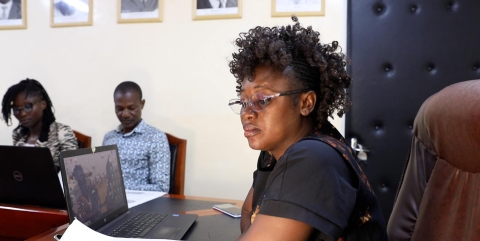
Burkinabè journalist Mariam Ouédraogo is dedicated to covering war and its devastating consequences on civilians in her native country of Burkina Faso.
For a series of reports in which she documented the horrors experienced by women, including rape and assault by terrorist groups in the West African country, she became the first woman journalist to win the prestigious Bayeux Calvados-Normandy Award in 2022.
This year, Ouédraogo is a 2023 ICFJ Knight International Journalism Award winner, celebrated for her impactful reporting and commitment to covering sensitive issues with tact.
Ouédraogo prioritizes survivors’ experiences and perspectives in her work; journalism should center humanity, she believes. This can take a mental toll, however: Ouédraogo took a break from reporting due to effects of post-traumatic stress disorder. "I've been working on getting better; it's become part of my daily routine," she said.
During a recent ICFJ French Crisis Reporting Forum session, Ouédraogo reflected on her reporting about women affected by terrorism and shared insights and advice for conducting investigations on sensitive topics. She discussed how to responsibly interview subjects about these issues, and offered advice for how journalists can take care of themselves along the way.
Here are some key takeaways.
Define your objectives
Through her reporting, Ouédraogo has sought to "comprehend and elaborate on the phenomenon [of sexual violence], uncover the extent of the violence and document the resilience strategies of survivors."
Journalists should establish clear objectives before heading to the field to report, she advised. "It's vital to understand how to approach victims, as they are enduring immense pain,” she said. “When you're delving into such sensitive issues, it's crucial to adapt to the reality, exercise patience and display sensitivity. Building a rapport is about maintaining a human connection, not just assuming the role of a journalist.”
Ouédraogo leverages this approach to persuade her editors of the importance of the work. It’s a tactic she believes other journalists can employ. "The topic of sexual assault remains a sensitive issue in our society, particularly when it involves acts committed by armed individuals,” she said.
She recounted how, after a year of in-depth research and reporting, which included late-night discussions with her interview subjects, she shed tears alongside a survivor of sexual assault. Still, she advised colleagues to maintain some emotional distance with sources to avoid overwhelming themselves mentally and emotionally.
Journalists, upon returning from the field, should also give themselves time to adjust and reflect, she added: "Allocate time to process your experience, allow for reflection and comprehend your initial reluctance to revisit the testimonies.”
Investigate strategically and tactfully
Journalists should incorporate a diversity of perspectives in their reporting, and mix up storytelling methods, said Ouédraogo. For instance, consider packaging your coverage into a series of articles instead of cramming lots of information into one. This strategy helped her land the Bayeux Calvados-Normandy Award.
It’s critical to show respect for sources, and safeguard their anonymity when necessary. Consider using illustrations in your stories, or photos of survivors taken from behind that lack identifying features, she suggested.
Journalists should not hesitate to investigate the topic of sexual violence, she urged. "Persist in producing these in-depth articles,” said Ouédraogo. “Even if they don't generate revenue for the newsroom, they prompt decisions and drive change.”
Maintain physical safety
To tell these harrowing stories, Ouédraogo made sure to always listen attentively; yet at times, she found herself overwhelmed by tales of unimaginable cruelty. "You're going to feel helpless in some situations,” she warned.
Before heading to the field, Ouédraogo continued, it's important to consult with authorities to gain a comprehensive understanding of your surroundings and subject matter: “Make every effort to secure the necessary permissions, provided it doesn't jeopardize your investigation.”
Journalists must be flexible in the face of evolving field conditions, broaden their source network and cultivate trust, she said: "Avoid drawing undue attention; at times, it’s helpful to avoid wearing badges or vests to better blend in with one’s surroundings.”
Journalists should also be aware of challenges they may encounter, and plan accordingly. Ouédraogo recalled how, in past reporting, she delved into the daily lives of women coerced into prostitution to gain a deeper understanding of the consequences they faced. "Without going all the way, I was able to connect with people who exploit raped women for vile prices," she recalled.
Prioritize mental health
Ouédraogo took a hiatus from her work after being diagnosed with vicarious trauma due to the nature of her investigations.
"It's a necessity because what you encounter in the field will often diverge significantly from your initial expectations," she said. "Seek guidance from a mental health professional to preempt any emotional setbacks while on the job."
Reporters should also take into account "data scarcity, and limitations on time and financial resources, particularly when our newsrooms don't provide these resources."
Protecting sources while reporting is paramount. “Strik[e] the right balance between maintaining anonymity and ensuring accuracy, so as not to produce a story that lacks authenticity,” she urged.
This article was originally published on IJNet French. It was translated into English by Nourredine Bessadi.